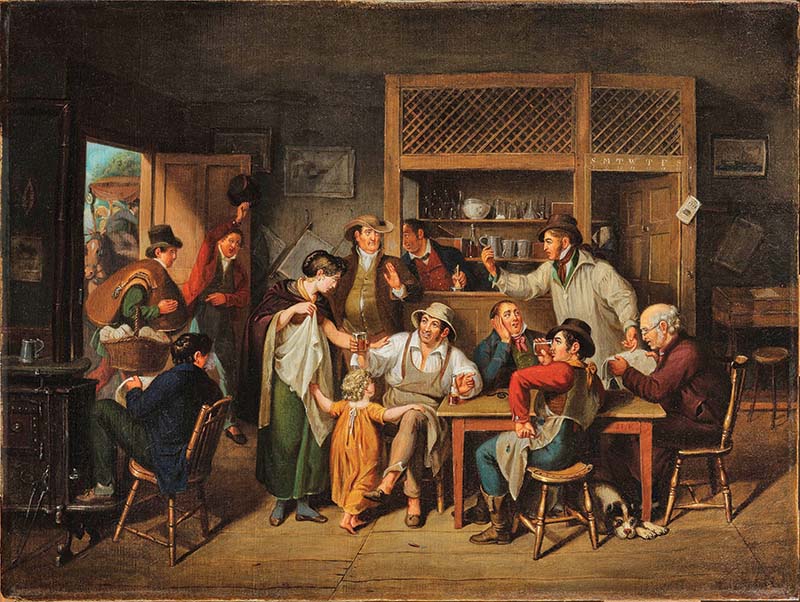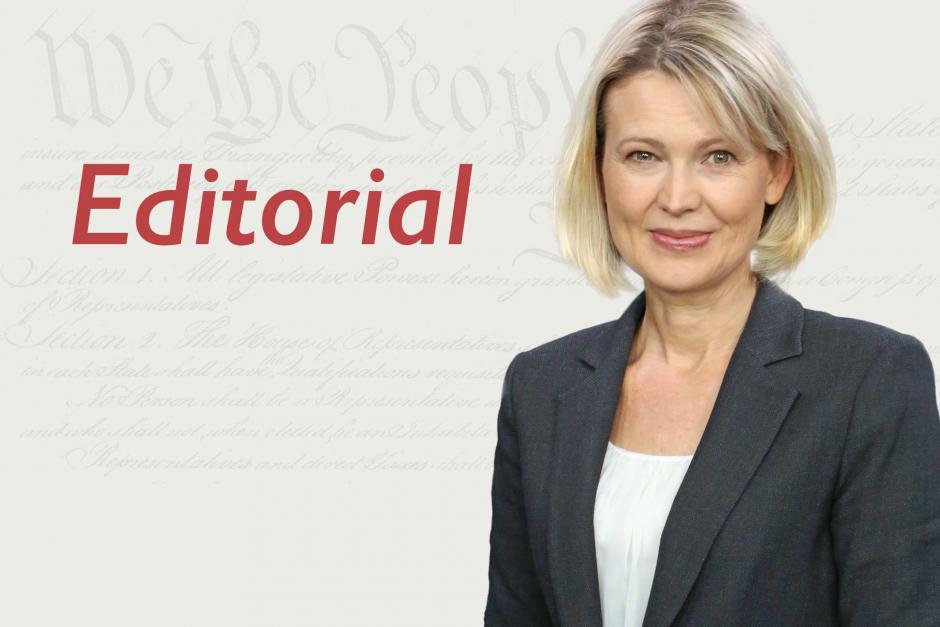Free Speech for Me, But Not for Thee
Bettina Krause March/April 2022In July 1798 President John Adams was making his way with great pomp and ceremony from the then capital, Philadelphia, to his summer retreat in Massachusetts. As his carriage passed through the town of Newark, New Jersey, the president was welcomed with speeches, a parade, and a ceremonial 16-cannon salute.
Luther Baldwin, a skipper of a trash barge on the nearby Passaic River, was seated with friends in a local tavern as the cannons boomed. They were unimpressed. Luther was overheard laughing and making a disrespectful—indeed, downright bawdy—joke about the president and the cannon fire.1

Two months later Luther and his cohorts found themselves facing charges under the recently passed Sedition Act, which, among things, forbade speaking “seditious words tending to defame the president and government of the United States.” Duly convicted, Luther and his companions sat in federal prison until they could raise enough money to pay their court-imposed fines. Their run-in with this repressive law was one of some 25 similar episodes involving newspaper editors, printers, politicians, and others who criticized the administration’s policies.
The supreme irony of all of this, of course, is that the Sedition Act was passed a mere seven years after the ratification of the Bill of Rights, with its lofty affirmation of free speech as a cornerstone liberty. A commitment to free speech, the founders believed, would help distinguish the new American republic from the monarchical authoritarianism of the Old World. Yet just a few years later President Adams saw fit to approve a politically driven law suppressing speech, ushering in what a later Supreme Court justice would characterize as one of our nation’s “sorriest chapters.”2
It’s easy to forget that America’s founders were very much like us, with a sometimes-inflated confidence in their own political views and an all-too-human aversion to criticism.
Tolerating criticism or dissenting opinions isn’t easy. If it were, Twitter would be a haven of reasoned and pleasant debate. For most of us, though, the “wrongness” of others triggers a response that’s more emotional than rational.
Today freedom of speech is simultaneously one of the most unifying and divisive parts of our constitutional birthright. It’s unifying because a vast majority of Americans, regardless of their politics, celebrate America’s commitment to free speech. In a recent national survey some 99 percent of respondents called it an “important constitutional right.”3
It’s divisive, however, because this idyllic bipartisanship shatters the moment discussion turns to practical questions, such as what type of speech falls beyond the pale and is undeserving of protection, whether constitutional or otherwise.
The problem, of course, is that there will always be a high level of subjectivity in any assessment of speech. One person’s legitimate opinion is another person’s misinformation. One person’s hate speech is another person’s deeply held religious belief. So when lines start being drawn between acceptable and unacceptable speech, whose perspective determines where those lines should go?
Increasingly, though, lines are being drawn. There seems to be a growing moral orthodoxy in America that says that in some circumstances censorship is not only acceptable but necessary. According to the Pew Forum, almost half of U.S. adults would like the government to step in to sort out misinformation online—that’s an astounding number of Americans who appear comfortable with a direct violation of the First Amendment.4
Censorship fever seems even to have reached that bastion of radical free speech advocacy, the American Civil Liberties Union, which in the past has defended the rights of everyone from flag burners to neo-Nazi protesters. According to former ACLU executive director Ira Glasser, ACLU lawyers are now being asked to be “advocates for progressive values” by defending free speech only when it “doesn’t offend or threaten other civil liberties values.”5
This growing comfort with suppressing uncomfortable speech is both a progressive and conservative phenomenon. When a Georgetown Law School professor recently tweeted a poorly worded criticism of President Biden’s vow to appoint a Black woman to the Supreme Court, saying all options should be considered regardless of race, he tweaked the tail of a Twitter mob, which came after him en masse. Within days he was placed on administrative leave. On the other end of the political spectrum, individuals unsettled by ideas raised in critical race theory have introduced anti-CRT legislation in 22 states at last count. A number of these bills attempt to suppress discussion of CRT in ways that go beyond merely regulating a K-12 school curriculum.
Why does any of this matter for religious freedom?
It matters because the fate of religious freedom in America is utterly dependent on the fate of free speech. The two rights exist together or not at all.
In my work in international religious liberty advocacy, I’ve witnessed what happens in countries in which the majority decides what speech is “dangerous” or “offensive.” Whether it’s Pakistan’s anti-blasphemy laws or China’s high-tech regulation of anti-Communist ideas, religious minorities bear a brutal burden—legally and socially—when free speech is impaired.
So when the “wrongness” of others becomes unbearably irritating, the remedy isn’t to try to silence difficult voices. When we attempt to coercively suppress uncomfortable speech, we’re chipping away at the bedrock of our religious freedom. Instead, we have a better response at our disposal. We can speak.
1 There are many accounts of this incident online, or you can read Charles Slack’s fine discussion of the Sedition Act in his book Liberty’s First Crisis: Adams, Jefferson, and the Misfits Who Saved Free Speech (New York: Atlantic Monthly Press, 2015).
2 Watts v. United States, 394 U.S. 705 (1969), J. Douglas concurring.
3 Knight Foundation-IPSOS, “Free Expression in America Post-2020,” January 6, 2022.
4 Amy Mitchell and Mason Walker, “More Americans Now Say Government Should Take Steps to Restrict False Information Online Than in 2018,” Pew Research Forum, August 18, 2021, https://pewrsr.ch/37TynlF.
5 Andrea Cavallier, “Former ACLU Head Blasts Organization,” DailyMail.com, January 31, 2022, https://bit.ly/3uRXDW1.
Article Author: Bettina Krause
Bettina Krause is the editor of Liberty magazine.
